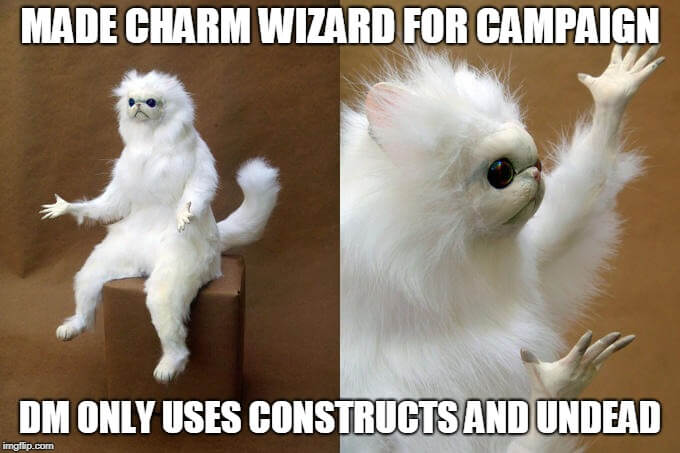- You Don’t Have the Drive
- You Won’t Leave Your Comfort Zone
- You’re a Frustrated Author
- You Don’t Know the Rules
- You Play Against the Players
You Don’t Have the Drive
There is no easy button when it comes to DMing. It takes time and energy to craft an enjoyable game experience for your group. You need desire and dedication to craft the best game experience possible. You must make D&D a time priority if you want to be successful.
The #1 killer of D&D games is they just fall apart. Schedules change, someone can’t make the game, and before you know it the game is dead. You can’t afford to take the day off. You need to dedicate your game time to providing a persistent gaming experience. Even if you don’t play the game you should, the group should still meet so everyone knows that day and time is game time.
Preparation is key. This is a divisive subject online for some reason. There are DMs who say they run great, off-the-cuff with no preparation.
I submit they run OK games without prep. You can run a decent off-the-cuff one shot. In a one shot the setting, characterization, NPCs, and bad guys don’t have to stand up after few seconds of scrutiny. But a multi-session campaign, not so much. I find this crosses over with the first point too often. If my DM isn’t putting time in away from the table he’s not taking the game, the world, the PCs, and the players seriously. Don’t be lazy, brainstorm and take some notes. Your friends aren’t asking you to solve the Gordian Knot.
Also, don’t take anyone seriously who tells you firsthand how great they are; that’s life advice. I’ve played with many self-professed, great DMs. There’s likely a correlation that each has also been an outspoken, no-prep DM. In the few instances they’ve done outside prep it’s obvious and the sessions are always better. You must spend time away from the table preparing.
At the table, DMing means spinning plates. You won’t have time to play around on your phone during the game. All your concentration must be on the game. You need to know what all the PCs and NPCs are doing and their responses to what happens next. If you play games and when it’s not your turn you immediately pick up your phone, DMing isn’t for you. Watch a streamed RPG and pay attention to the DM while the players are embroiled in conversation. That’s the DM juice. You can see the DM dialed in to the conversation, just monitoring. There’s no better reward for a DM than when you do your job well enough the players start playing without you. The DM is monitoring the conversation to see what they can add or change to make things more awesome. Often the players in conversation will come up with a way cooler solution, problem, or set of dramatic stakes than you prepared. The great DMs take those nuggets and weave them into the game.
You Won’t Leave Your Comfort Zone
Sometimes that means you’re not comfortable getting into the DM’s chair for the first time. This is especially difficult if you’re preparing to run for more experienced players. Being a player is easy. You show up and roll dice. Being a DM is hard and it means routinely screwing up. But, the more you do it the less you screw up and you’ll run better games for it.
For other people the first sign they’re not ready to grow as a DM is they never ask for player feedback. If you want to be a good DM you must continually work at being a good DM. Ask players at the end of a session if they have any questions, comments, or concerns about the game. This is a great tool I picked up from Stephen Wardle (d6 Mafia/DND Threshold). Learn what they liked, what they didn’t, and what direction they would like to see the campaign go.
Hand in hand with feedback is finding and trying new things. D&D has been around for 45 years. In that time enough RPGs and innovations have appeared to fill a library. You should have the drive as a DM to find the new, shiny piece of gaming that will take your DM experience to the next level. Maybe it’s handouts, the perfect soundtrack, or learning how to better describe spell effects. Always attempt to improve your game and try something new, especially something you’re not comfortable doing.
Watch other DMs work. See how they handle issues and overcome challenges to be a better DM. Get outside your comfort zone on rules systems. Read and play games with different mechanics, rules, and genres. What can you take from those games to make yours better?
Review your notes. Be critical of your own actions. What ideas did you try and what didn’t work out? Better yet, identify why they didn’t work out. Was your murder investigation plot poorly constructed? Maybe the players didn’t want to play that kind of game. Or the PCs didn’t have the right arrangement of skills, abilities, and spells to tackle the issue.
You’re A Frustrated Author
Have you ever thought how great your game would be if the players could just do the right thing? Do they constantly ignore the adventure hooks? You dangle a hook how no one’s seen villager X in a few days. The party blows it off to hit up the tavern so the bard can perform and the other PCs party.
Do you have to fight tooth and nail with your players to keep them on track? Remove all distractions, tangents, and alternatives to keep your players moving forward?
Then you want to tell a story, not DM a game.
Stories have characters, games have players. It’s the nature of the beast. As a DM your job is to help the players find a goal to achieve and then provide a challenging gauntlet of obstacles to achieving that goal. You shouldn’t hate when a player hatches with a clever idea that bypasses a challenge. The last thing you want is for your players to stop using their brains.
You must get player buy-in on whatever game you decide to run. Ask them what sort of adventures they want to explore. Work with each player to anchor their character to the world so it’s personal. It’s not your job to make sure every player has fun. But, it is your job to provide the platform and opportunity for each player to create his/her fun.
One of the biggest challenges DMs have is not knowing what the party is going to do next. It’s impossible to prep for every contingency. Luckily, this is easy to avoid. Ask the players to confirm what they’re doing next at the end of the session. If they confirm intent to travel to the imperial capital all you must prep is travel and entrance to the city.
The major point is you can’t script people. And it’s a human tendency that when pushed in one direction we have a natural inclination to resist. You can’t force your players or you’ll end up with no players. DMing is about putting the characters in a series of situations and seeing how they deal with it. Create problems, drama, and tension. Leave the resolution of all that up to your players. If you can do that you’ll be a great DM. If you can’t, fire up the old word processor and get to writing the next great work of fiction.
You Don’t Know the Rules
Have a solid understanding of the rules system is fundamental to being a good DM. You don’t have to know all the minutiae and every exception. but you must know how three core things:
- The core game mechanics
- Where the numbers come from
- The standard numeric range
For 5e number one means understanding the core game mechanic of the d20 system, 1d20 + Character Modifier + Situational Modifier. It also means understanding what and when to use advantage/disadvantage.
The second, you must be able to explain things like why the base for armor class is ten and why the base for save DCs is eight. You should know how to turn ability scores into ability modifiers without looking it up.
The third means you should know the normal distribution of numbers. Understand basic statistics like 2d6 distribution and knowing what would be appropriate DCs for your PCs. Knowing an average lock picking DC for your party’s 4th level rogue with an 18 dexterity is 19 (4 [modifier] + 4 [proficiency doubled with expertise] + 10 [55% chance on a d20 roll]).
You also don’t know when to engage the rules or when to call for die rolls. You have the rogue roll to unlock doors when there are not stakes. If the rogue fails to pick the door can she attempt it again without consequence? If the answer is yes, there’s no need to roll the dice assuming it’s within the rogue’s capability to unlock.
Or you let the rules dictate your game over common sense. Worse yet, your game devolves into discussions of rules interpretations and arguments. You lack the ability to take control of your game by making an adjudication and moving forward. Save those rules discussions and errata investigations for after the session. Keep the game flowing.
You Play Against the Players
You’re behind the screen and hungry for blood. You’re not satisfied until the party lies broken and bleeding before your minions. Every situation is all or nothing and the PCs are always scraping through by the skin of their teeth.
There are no easy wins, no cupcakes. Every time the party gets more powerful, so do the enemies. You escalate the difficulty until your players are only building the most combat-optimized, power PCs possible. You’re throwing combats at the players well above the listed challenge rating.
You don’t care if the party members make it to the story’s conclusion. You run every adventure like it’s the Tomb of Horrors; a meat grinder to wear down players and kill characters. More grist for the mill. You employ Tucker’s Kobolds, but miss the point and don’t consider context.
A good DM’s not out for blood. They create a gamut of challenges with varying difficulty; some easy, some difficult. Winding back and forth between ‘death by a thousand cuts’ resource grinding and knock out, drag out “going nova” set piece battles. They know sometimes the greatest challenge is one the players can’t solve with a sword.
And most of all a good DM is on the players’ side. She understands if the characters die the game ends. Killing characters is easy for a DM. Making them care about a character’s death is difficult.


